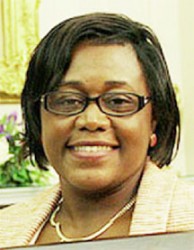The Guyana Government needs to take on the crime of human trafficking frontally and declare that it is a serious problem in the country and one that it intends to tackle. This would ensure that the country’s lawmen view it as a crime which needs to be seriously investigated, outgoing US Ambassador Brent Hardt has said.
Hardt, who also called for more resources to be given to the area not only to provide for the protection and reintegration of victims but also to train lawmen and frontline staff at the various ministries, said that it is important for the government to embrace the issue as a challenge that it is determined to tackle working together with all stakeholders.
However, he said the US State Department Trafficking in Person (TIP) reports on Guyana are being seen as recrimination, in circumstances where the situation was not so bad.

“I think that trickles down to law enforcement agents who get the idea that really we shouldn’t be spending too much time focusing too much energy on this because the government doesn’t think this is a major issue,” the ambassador said in an interview with this newspaper.
He said the time has come for the government to move past the “stale argument” of how big a problem trafficking is to focus on how the two countries can work together to go after the problem. He said that trafficking officials in the US are prepared to come to Guyana and have dialogue on the issue.
He pointed out that the direction and priorities always come from the top and “what one would love to see is a government which states very clearly [that] trafficking is an abomination and it is modern day slavery and we are not going to tolerate it in this country. While it exists everywhere in the world, we are going to do everything in our power to make sure that some of the most vulnerable people, young children and others are not going to be trafficked, and if they are we are going to protect them.”
He said once this message is seen and reinforced publicly more effort would be expended by law enforcement agencies and ministry employees because they would see it as something that the government does not try to diminish.
Hardt admitted that his own country, the United States, has a tremendous problem as sizable numbers of people are trafficked, but the difference is that the authorities go after people, convict them and put them behind bars.
“And that is what we want to see here; it is not a case of how many cases of traffickers there are and in relative terms, numbers in Guyana are smaller, but certainly it is a serious problem and if you speak to people who are in the mining areas and the remote areas…there is no doubt that it is there.”

The recent US TIP report has once again placed Guyana on the Tier 2 Watch list and has indicated that the Government of Guyana still does not fully comply with the minimum standards for the elimination of trafficking in persons but is making significant efforts to do so.
While the government is still to respond to this year’s report, it had rejected the 2013 report from the State Department, saying that it was “riddled with fabrication” and ignored efforts at combating human trafficking.
According to the ambassador the key focus of this year’s report was holding perpetrators of the crime in Guyana accountable.
He pointed out that while there was some “good news” on this front in that three traffickers were tried and convicted, it was later discovered that all three had been released on bail.
“When we enquired as to the reasons why, no one was able to tell us the basis for them being released, and we understand from some sources that those who were released are back in the bush doing what they were doing before,” he said.
He noted that if persons see that someone can be tried and convicted and then they are back out doing essentially the same thing that “erodes the sense that is so critical to preventing TIP that there would be consequences, and it creates an enabling environment where people think we can take advantage of these vulnerable people and we wouldn’t have to suffer any consequences for it.”
According to the ambassador that is the most critical issue even as he acknowledged that there are issues in the judicial system as a whole which are not unique to TIP. However, he expressed the view that those cases can be used to strengthen the overall judicial system and correct some of the weaknesses that exist.
‘Great concern’
President of the Guyana Women Miners Organisation (GWMO) Simona Broomes, whose organisation has devoted significant effort to fighting the crime, has repeatedly called upon the government to demonstrate that it is serious about fighting TIP.
Speaking to this newspaper following the release of the report she maintained that it is of great concern to her organisation that the government does not see trafficking in person as a serious problem. She said that even if just one survivor is rescued, a clear message should be sent that the crime is going to be fought from all ends. However, what has been happening, she went on, is that the police have been slow to investigate, and the same problem is being faced in relation to domestic violence, because many times the police did not even see these as crimes.
“It is the same challenge that is being faced with trafficking in person… And many times it is like Ms Broomes disturbing the peace of the people when she talks about trafficking in persons,” Broomes said.
She said the mere fact that for the entire reporting year the GWMO was instrumental in having five different trafficking matters brought before the courts, yet none resulted in a conviction is of serious concern. She pointed out that a member of the police force was charged with trafficking and raping one of the victims, yet he treats the issue as a joke. She mentioned the matters being dismissed against Ann-Marie Carter for a lack of prosecution. The victims in that matter indicated after that they were not informed about the court dates so failed to attend and testify.
The matter against Patricia Crossman was also dismissed after the victim failed to attend court and Broomes pointed out that the victim and her child have been missing since the beginning of the case, and even though her spouse had indicated that the last time she was seen was in the company of the alleged trafficker the authorities have failed to act.
“It seems as if the fastest thing is to get the victims out of the state homes and then they are re-trafficked. They are not being contacted to attend court…and the matters are being thrown out,” Broomes said.
Broomes noted that there has been no survivor whom her organisation rescued who has been assisted in the re-integration process as is catered for under the trafficking act. For her the act should be clearer when it comes to domestic victims, as she said in the case of an Indian national who was rescued at least an apartment was rented for him. She said the last she heard from the victim though was that he was planning to accept a sum of money offered to him and return to India.
“It takes the will of the government to make that significant change to really bend the bone of human trafficking. It takes the will also of the parliament…the entire parliament to see human trafficking as a crime,” Broomes said.
‘Demand for underage girls’
Broomes told this this newspaper that the government needs to step up and see trafficking as a crime as young girls are the ones who are suffering the most.
According to Broomes there is a high demand for underage girls as the men in the interior are not inclined to spend their money on older women.
“And that is scary for me…even in the city clubs and shops are not employing older women,” Broomes said.
She pointed out that the Guyana Geology & Mines Commission (GGMC) is not implementing the regulations to regularize the brothels and shops in interior locations, and if this were done it could help to stem the increase in the crime as shops would not just spring up everywhere.
Broomes said she also feels very guilty when she rescues survivors and is not able to help them to improve their lives.
“Even the survivors would say that they were better off when they were in the bush because at least they make a money once in a while,” she said.
The GWMO in partnership with the Sisters of Mercy and more so the Roman Catholic community are working towards opening the first ever home for survivors of human trafficking which is aimed at ultimately giving them a fresh start in life.
She said she has been approached by many government officials to make a statement about the kidnapping of the many young girls in Nigeria, but Broomes said while she is indeed concerned for the safety of those girls she is more concerned about what is happening to our girls and boys in the interior.
“What about our girls? I want the government and those concerned to come up with the resources and support so that we can go into the interior and bring back our girls home,” the GWMO President said.
Broomes said she will continue to fight for the victims as she has seen their pain and she can no longer sit and not do anything to help them.
“I would not stop fighting, they would have to kill me; my equipment is covered in the interior. I am scared for my children but I will keep fighting. I don’t care any more I have seen enough and cannot just not do nothing.”
More resources
Meantime, Ambassador Hardt called upon the government to devote more resources to protecting victims as while it has made a modest allocation to the Ministry of Human Services equivalent to US$15000 a year, this can barely get persons into the interior and provide lodging for those who might have been trafficked.
“Given all the priorities I think [there] should be some more resources devoted to that, more resources devoted to training front-line officers from the various ministries, law enforcement as well [to] investigat[e] TIP properly.”
On this front the ambassador revealed the US Embassy search for funding to assist in the fight is making some headway. It is hoped that an announcement on this would be made in a few months’ time. The funding is expected to be funnelled through various organisations including the GWMO, Amerindian People’s Association (APA), Red Thread, Help & Shelter and the Guyana Women Lawyers Association.
“We have been talking with some of the stakeholders and I think we have some good proposals and hopefully we would be able to find some ways of going forward,” the ambassador said.
“It would take a multi-stakeholder effort with stakeholders working closer with the government to address it, so we are trying to support that effort,” he said.





